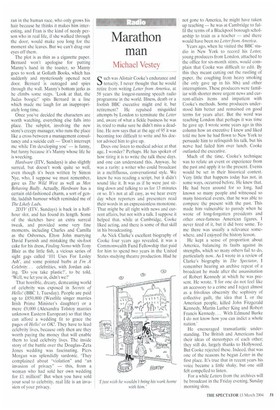Marathon man
Michael Vestey
C uch was Alistair Cooke's endurance and tenacity, I never thought that he would retire from writing Letter from America, at 58 years the longest-running speech radio programme in the world. Illness, death or a foolish BBC executive might end it, but retirement? He repulsed misguided attempts by London to terminate the Letter and, aware of what a fickle business he was in, tried to make sure he didn't miss a deadline. He now says that at the age of 95 it was becoming too difficult to write and his doctor advised him to give up.
Does one listen to medical advice at that age, I wonder? Perhaps. He has spoken of how tiring it is to write the talk these days, and one can understand this. Anyway, he was a rarity: a writer who could broadcast in a mellifluous, conversational style. We knew he was reading a script, but it didn't sound like it. It was as if he were just sitting down and talking to us for 13 minutes or so. It's not at all easy, as we hear every day when reporters and presenters read their words in an expressionless monotone. That might be all right with news and current affairs, but not with a talk. I suppose it helped that, while at Cambridge, Cooke liked acting, and there is some of that skill in his broadcasting.
As Nick Clarke's excellent biography of Cooke four years ago revealed, it was a Commonwealth Fund Fellowship that paid for him to spend two years in the United States studying theatre production. Had he not gone to America, he might have taken up teaching — he was at Cambridge to ful fil the terms of a Blackpool borough scholarship to train as a teacher — and there would have been no Letter from America.
Years ago, when he visited the BBC studio in New York to record his Letter, young producers from London, attached to the office for six-month stints, would complain that Cooke was difficult to edit. By this they meant cutting out the rustling of paper, the coughing from heavy smoking (he only gave up in his 80s) and other interruptions. These producers were familiar with shorter more urgent news and current-affairs items and impatient with Cooke's methods. Some producers understood him better and remained on good terms for years after. But the word was reaching London that perhaps it was time he gave up. I wrote some years ago in this column how an executive I knew and liked told me how he had flown to New York to persuade him to relinquish his talk, but his nerve had failed him over lunch. Cooke outlasted the executive.
Much of the time. Cooke's technique was to relate an event or experience from the past and apply it to the present. Events would be set in their historical context. Very little that happens today has not, in some ways, occurred before. He knew that. He had been around for so long, had known so many people and witnessed so many historical events, that he was able to compare the present with the past. This made him vulnerable to parody when he wrote of long-forgotten presidents and other once-famous American figures. I never tired of it, but it did bore some. To me there was usually a relevance somewhere, and I enjoyed the history lesson.
He kept a sense of proportion about America, balancing its faults against its strengths, which so many others fail to do, particularly now. As I wrote in a review of Clarke's biography in The Spectator, I remember hearing an archive repeat of a broadcast he made after the assassination of Robert Kennedy at which he was present. He wrote, 'I for one do not feel like an accessory to a crime and I reject almost as a frivolous obscenity the sophistry of collective guilt, the idea that I, or the American people, killed John Fitzgerald Kennedy, Martin Luther King and Robert Francis Kennedy. . . With Edmund Burke I do not know how you can indict a whole nation.'
He encouraged transatlantic understanding. The British and Americans had their ideas of stereotypes of each other; they still do, largely thanks to Hollywood. But Cooke rejected these. Indeed, that was one of the reasons he began Letter in the first place. It's true that in recent years his voice became a little shaky, but one still felt compelled to listen.
For a while Letters from the archives will be broadcast in the Friday evening, Sunday morning slots.


































































 Previous page
Previous page